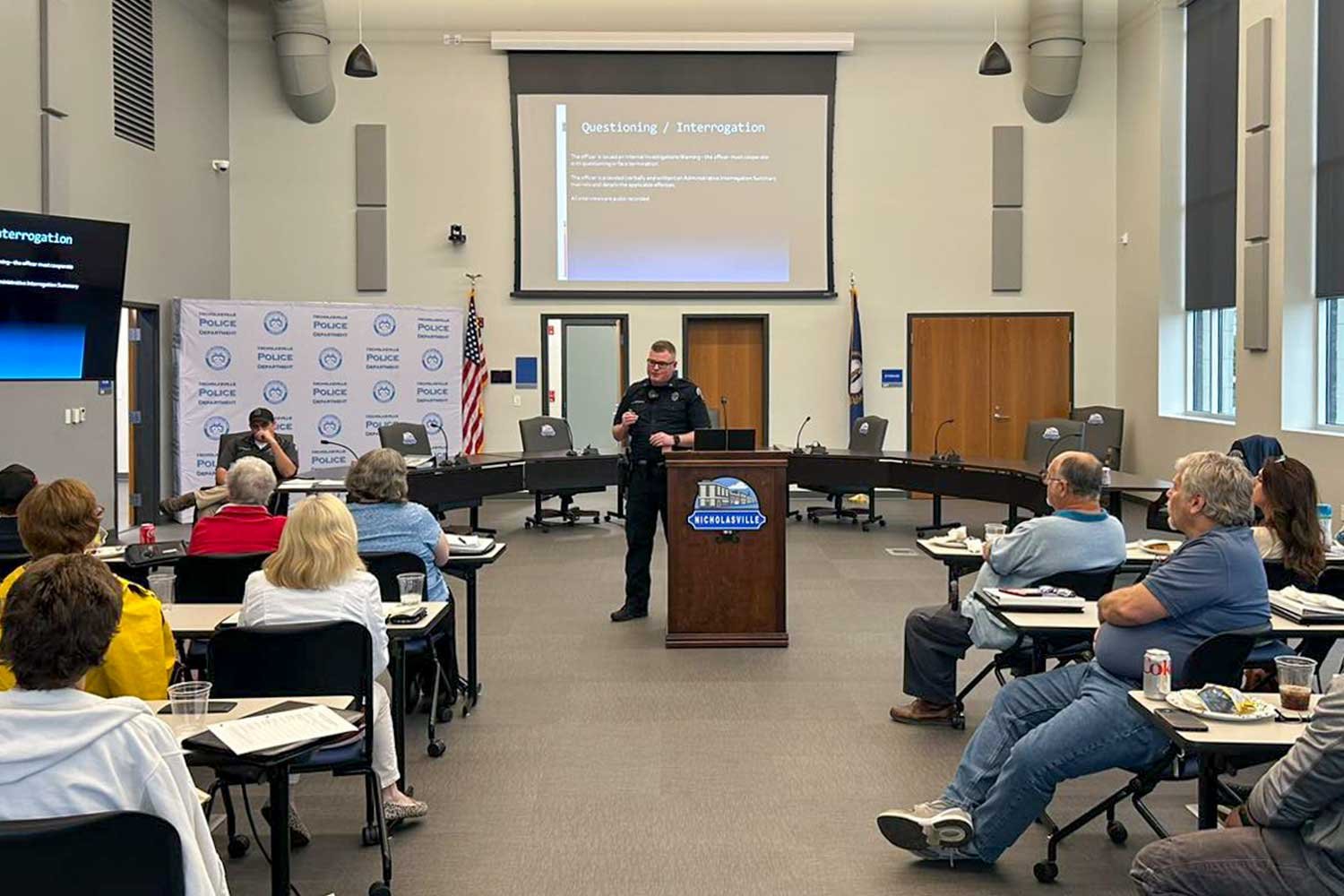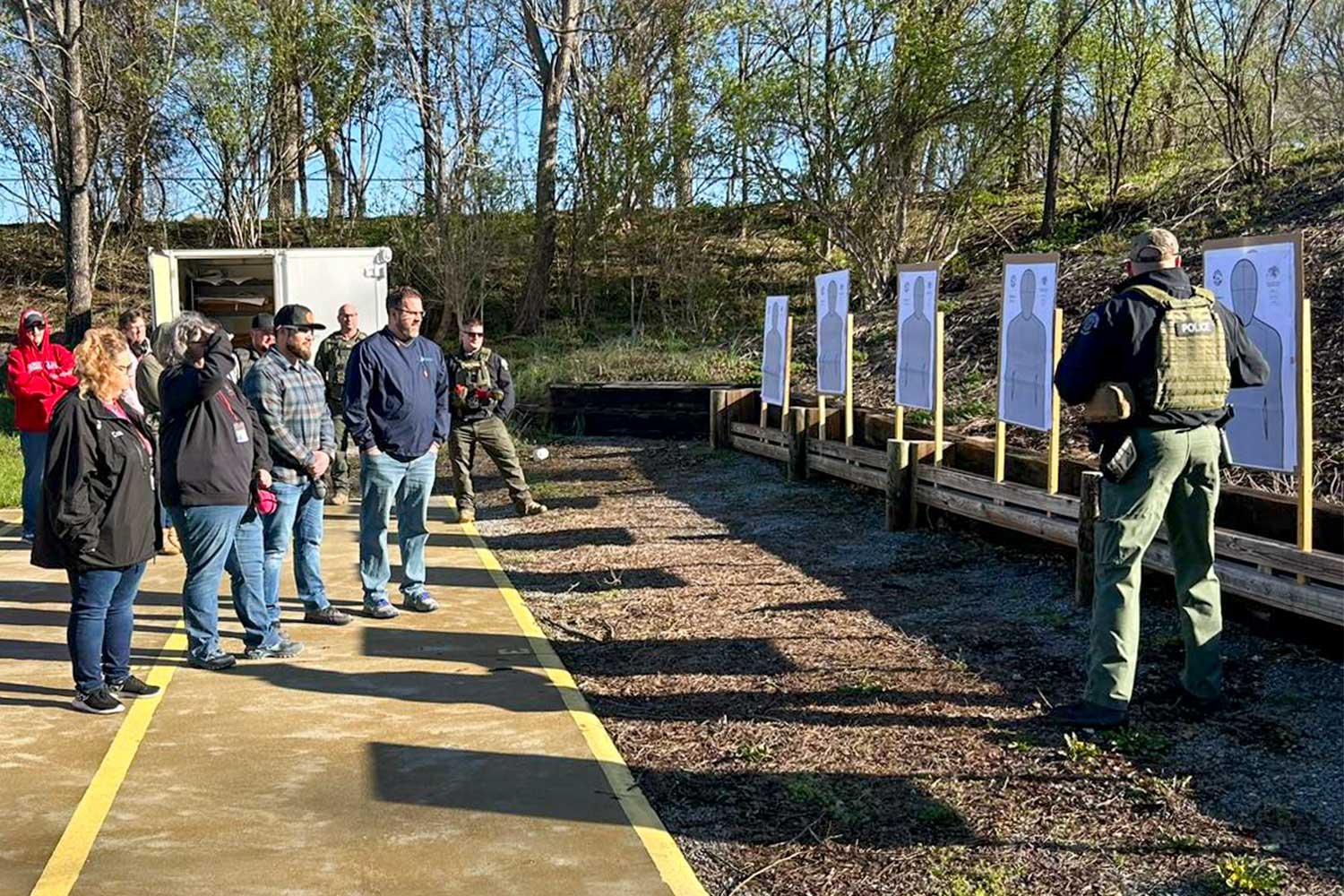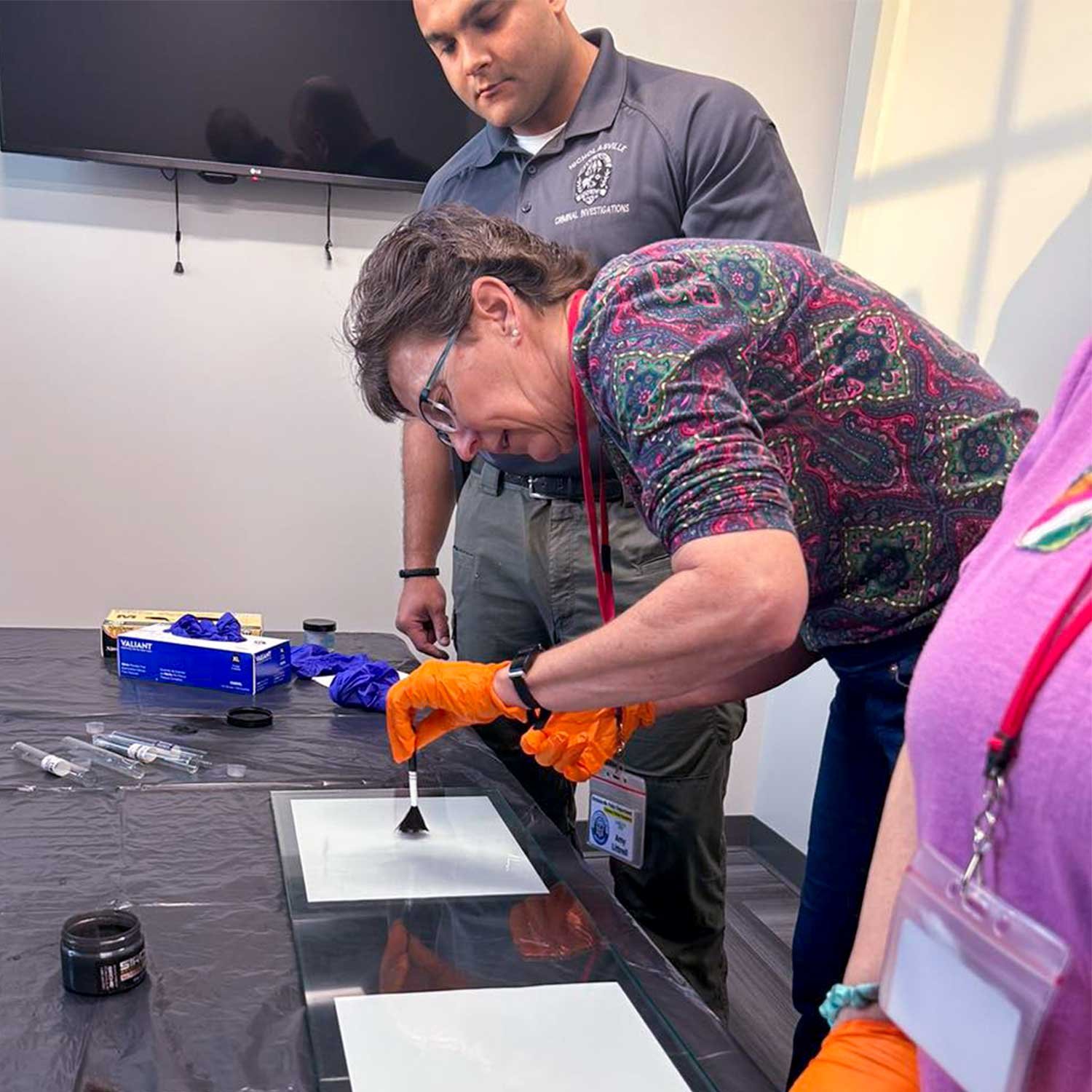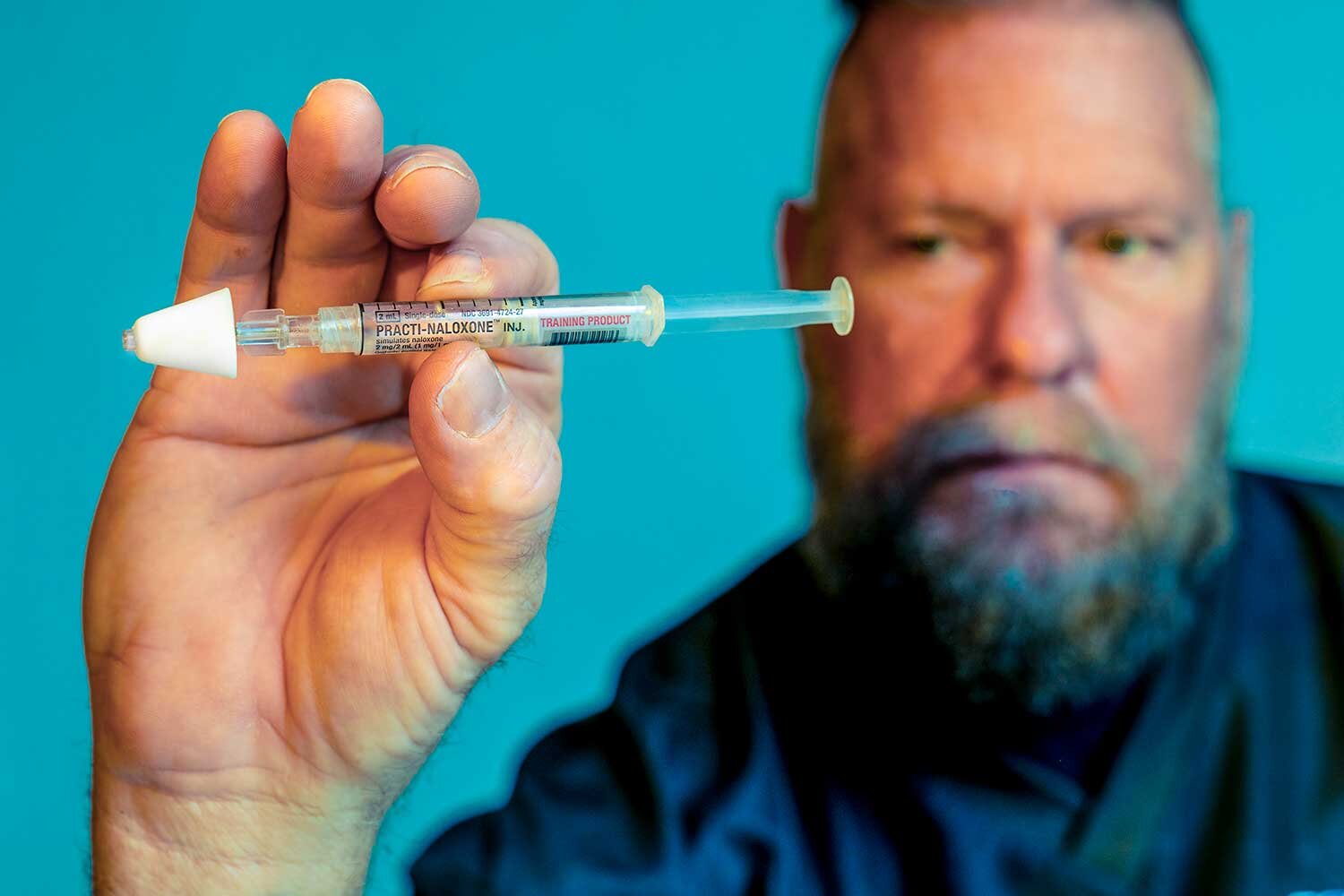Citizens’ Police Academies: An Eye-Opening Experience for the Public
PICTURED ABOVE
From left, Nicholasville Police Department Community Services officers Anthony Ruggiero and Jermaine Jackson, along with Police Chief Michael Fleming, pose outside NPD’s new faclity. NPD has a robust Citizen’s Police Academy that includes three different levels. (Photo by Jim Robertson)
In an age where law enforcement is under the public’s microscope, citizens’ police academies (CPAs) have proven to be an effective outreach program for many police agencies across Kentucky that provides citizens a glimpse into real-life policing.
“One of the things we are hoping for from our citizens is an open mind,” said Officer Jermaine Jackson of the Nicholasville Police Department’s Community Services Division. “If you want to come and get an idea of what we do, please don’t be closed-minded. There is not another job in the world that is more popularized or under more scrutiny than policing.”
Jackson believes mediums such as television, movies and books often paint a skewed picture of life as a law enforcement officer.
That’s where CPAs come into play, NPD Officer Anthony Ruggiero added.
“Our citizens come through the academy and get an eye-opening look at what we do,” he said. “That’s what we strive for; we want to open their eyes to current events and to see what we do. That is one thing we pride ourselves on.”
Richmond Police Major Josh Hale echoed Ruggiero’s summation.
“The ultimate goal is to bridge that gap and educate the public in what law enforcement is really like,” Hale said. “It’s not the cops on TV. It’s not CSI. These are real people who do this every day, and they go home to their families. Secondly, we teach that police officers are human. We make mistakes. When we make mistakes – I can’t control what the public will say – but I can control how we react to it. If something does happen, we are transparent.”
Sgt. Tony Sacra with Louisville Metro’s Community Engagement Unit said one of his agency’s CPAs goals is gaining the public’s trust.
“The class is to build trust in the community by learning what each unit (officer) does daily,” Sacra said. “We have people interested in both sworn and civilian positions and some who are just interested in how LMPD operates.”
Types of CPAs
Madison County is home to multiple law enforcement agencies. Hale said it only makes sense to offer citizens a well-rounded CPA experience by holding a joint course with all the agencies involved.
The Madison County CPA is a partnership of the Richmond, Berea and Eastern Kentucky University police departments, the Madison County Sheriff’s and coroner’s offices as well as the Madison County Detention Center, Kentucky State Police Post 7 and the Department of Criminal Justice Training (DOCJT).
“Everybody has a unique role, and to educate (the public) properly, you must have all facets of law enforcement involved,” Hale said. “It’s important to realize that these law enforcement entities require a different lesson. That’s why we showcase the multiple agencies.”
While most CPAs target audiences are adults, many agencies like Nicholasville are offering CPAs directed at teenagers.
Jackson said NPD held its first youth CPA in 2020, just before the pandemic hit.
“It is more scaled down from our regular CPA class to make it more palatable for our youth,” Jackson explained. “We can’t throw everything we do for our adults at the youth, so it’s tempered a bit. We condense it down to a week. We go over everything like traffic stops and investigations.”
NPD’s ideal age range for its youth CPA is 14-16-year old’s, which places the student between the eighth and 10th grade, Jackson continued.
“After they turn 16, they can enter an Explorer or Cadet program,” he said. “Right now, we’re not offering (Explorer or Cadet program), but it’s in the works for the future.”
NPD also offers a Master CPA class for adults who have completed the regular CPA and are members of its alumni association.
“Once they complete the first class and become an alumnus, they’ll have an opportunity, when we offer it, to go through the master’s course,” Ruggiero said. “We put that on for our alumni, geared toward investigations. They’ll get a (mock) case, and the class members will work it.”
Ruggiero explained that the cases come from the agency’s criminal investigations unit, and the course will begin with an introduction to the different crimes class members will be discussing.
“Then they will build a case, find suspects, conduct interviews, track them – all of the police things we do, and we follow it to the jury trial,” he said. “We’re also going to try and do a mock jury trial as well. The master class is four weeks, and the jury trial, if we do it, will be the fifth week.”
All in the Family
Life as a police officer extends well beyond the squad room and cruiser. The occupation often spills over into an officer’s home life.
In its most recent CPA in the spring, NPD included a block where officers' spouses discussed what policing is like from their perspective.
“The message was: Who these people are married to is not what’s important,” Jackson said. “It’s about what it is like for them to have their loved ones who do this job. What do they deal with, and what do they see at home? There wasn’t a dry eye in the house that night.”
Planning and Budgeting
Many factors go into a successful CPA, so it’s important to factor everything in during budgeting. This includes expenses such as providing food to the officers who work extra hours to teach a specific night.
In the case of LMPD, officers from its legal advisory team, traffic units, training, K-9, SWAT, mounted patrol, river patrol, air unit, special victims, crime scene unit, homicide unit, criminal investigations, health and safety, dispatch, recruiting and the Community Engagement Unit take time to teach the many aspects of the CPA.
“Each unit sends an officer to present about their unit,” Sacra said. “We do not use volunteers.”
Hale said it takes the entire village to pull off a successful CPA, and coordination is vital during a joint CPA.
“You’re talking about agencies where people are either volunteering or being voluntold that they will be somewhere for 10 straight weeks,” he explained. “It can be taxing on manpower, but it is a major plus in terms of community service.”
In addition to personnel and monetary costs, Hale said facilities must be factored in as well.
“It is taxing for DOCJT because of the use of its facilities, and it takes up time for (DOCJT employees) to be here,” he said.
“You also may be taking things from the budget,” Hale continued. “We like to ensure people are fed and have something to drink, especially for graduation. So (RPD) utilizes our community services budget, and we have a reasonable budget, but other agencies may still need (a robust budget).”
Educating the public on the realities of policing goes a long way in nullifying the effects of scrutiny mass media sometimes portrays, and CPAs are a great tool in overcoming those obstacles, Jackson summarized.
“It’s a hurdle law enforcement everywhere must climb over,” he said. “We want (the public) to keep an open mind, and CPA helps explain things.”








